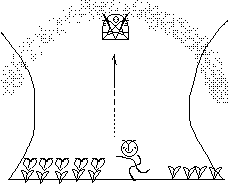Tanka and the Pictograph in Earth Language (EL) - April 2005 -
"a child's heart" 「子供の心」 by Kevin

 .
.  .
.  .
. 
 .
. 

This is an EL (Earth Language)
experimental page to enjoy
the image of a haiku/short
poem originally in English/Japanese.
When you can't see the Japanese parts, please
don't mind and just skip those parts.
地球語の文字や文字絵を用いて詩的表現や翻訳を試みる実験のページです。
For this month, I'm picking a tanka from Feb. 27th verse in Today's Tanka in Kevin's Home,
introduced by Mamico (English haiku author last fall).
The author, American Kevin is teaching English in Japan, creating his web site
in Japanes.
I smiled with sympathy at his small mistakes of Japanese,
imagining my own similar misses in my English pages.
The original verse was in February, but this tanka made me recall the hazy
sky
in blossomy season of my childhood after WW2.
When coming back from a fresh school day,
an empty home was there with no family members, books and toys;
so the only thing I could do was to go out again.
I was hungry in the vast sky and felt the time extending infinitely.
I flew in the sky with my imaginary wings...
Contrary to my image, the boy in the tanka might get the Cupid's archery from the sky.
The author Kevin and Mamico have started their new lives in Osaka since
the end of March, they say. Congratulations!
今月は、日本で英語を教えるアメリカ人、Kevinさんの
Today's Tanka in Kevin's Home 2月27日の短歌からです。
Kevinさんは、昨年秋に掲載のMamicoさん
からご紹介いただいたのですが、
この3月末、お二人の大阪での新生活がスタートしたそうです。おめでとう!
Kevin's Home
は、ところどころ文法や表現がおかしかったりしながらも、
日本語でがんばって表現しておられます。
私のサイトの英語もこんなふうに少しヘンテコなんだろうなと想像しながら、
同じように苦心してるこんなページを見るとうれしくなります。
原作は2月が舞台ですが、わたしには、
空腹を抱えていた子どものころの花曇りの空が浮かびました。
戦後で、入りたての小学校から帰宅しても家には誰もおらず空っぽ、
テレビはもちろん、本もおもちゃもなく、外に出るしかなく、
空はやたらに広く、時間も永遠に続くように感じられました。
この歌は、そんな空で想像の翼を羽ばたかせたころを思い出させてくれました。
[a child's heart] 「子供の心」
 English
verse by Kevin:
English
verse by Kevin:
having knocked
an angel from the air
with a slingshot
the boy shivers and
laughs softly to himself
Japanese verse by Kevin:
パチンコで空から天使を打ち落とし 子どもは静かににっこり笑う
EL translation:


















The angel in the pictograph is added a small face (文字絵の中の天使には、小さな顔が添えられています)
 : flower (花)
: flower (花)  : grass (草)
: grass (草)
 {
{ preposition,
preposition,  verb symbol}: to show the following phrase works as a verb, modifying
the front word or predicate of the sentence
verb symbol}: to show the following phrase works as a verb, modifying
the front word or predicate of the sentence
(これに伴う文字群は、前または述語を修飾する動詞の文節だと示す)
 {
{ {41( move),{24,31}}: flexible like a rubber (柔軟/弾力のある),
{41( move),{24,31}}: flexible like a rubber (柔軟/弾力のある),  line }: elastic/rubber band (ゴムひも)
line }: elastic/rubber band (ゴムひも)
 {
{ (hieroglyph type) shot/shooting (射),
(hieroglyph type) shot/shooting (射),  tool (道具)}: gun/shooting tool (射る道具)
tool (道具)}: gun/shooting tool (射る道具)

 : (elastic) slingshot (パチンコ)
: (elastic) slingshot (パチンコ)
 {
{ touch (surface-related),
touch (surface-related),  violent)}: beat (打)
violent)}: beat (打)



 : knock/beat with the
slingshot (used by the subject of the
sentence) (パチンコで撃つ)
: knock/beat with the
slingshot (used by the subject of the
sentence) (パチンコで撃つ)
 : to indicate an accusative case of a verb, and that is influenced
by the action of the subject.
: to indicate an accusative case of a verb, and that is influenced
by the action of the subject.
(次が動詞の対象語だと指示)
 {{
{{ wings (by the total shape),
wings (by the total shape),  relation,
relation, existence}: angel (天使)
existence}: angel (天使)
 : preposition
(前置符)
: preposition
(前置符)
 {
{ nature,
nature,  space}:
sky (空)
space}:
sky (空)
 : the indicator
of the subject of the sentence (続く語が主語だと示す)
: the indicator
of the subject of the sentence (続く語が主語だと示す)
 {
{ child {wonder, life},
child {wonder, life},  'male' in this case}: boy (少年)
'male' in this case}: boy (少年)
 gd (grammatical notation): To form a verb, meaning that (the
subject) become(s) in the situation
gd (grammatical notation): To form a verb, meaning that (the
subject) become(s) in the situation
shown by the following character/phrase; or (the
subject) do/does the following action. Here this works for both  and
and  .
.
(動詞符:つづく文字の状態になるという意味で動詞を構成)
 {
{ move,
move, wave}: shaking (ゆれ、震え),
wave}: shaking (ゆれ、震え),

 : shake (vi) (震える)
: shake (vi) (震える)
 : (conjunction) and (接続符、そして)
: (conjunction) and (接続符、そして)
 {
{ deny,
deny, sound}:
silent (無音)
sound}:
silent (無音)
 {
{ face,
face, open}: laughing,
open}: laughing,

 : laugh (vi.) (笑う)
: laugh (vi.) (笑う)
 {
{ heading direction,
heading direction,  } : to, for~へ(の)
} : to, for~へ(の)
 {
{ the status position,
the status position,  in}: (one)self, my (our) own (自身)
in}: (one)self, my (our) own (自身)
EL translation by Yoshiko
to the top
 English
verse by Kevin:
English
verse by Kevin:












 : flower (花)
: flower (花)  : grass (草)
: grass (草) {
{ {
{ {41( move),{24,31}}: flexible like a rubber (柔軟/弾力のある),
{41( move),{24,31}}: flexible like a rubber (柔軟/弾力のある),  {
{ tool (道具)}: gun/shooting tool (射る道具)
tool (道具)}: gun/shooting tool (射る道具)
 : (elastic) slingshot (パチンコ)
: (elastic) slingshot (パチンコ) {
{ touch (surface-related),
touch (surface-related),  violent)}: beat (打)
violent)}: beat (打)

 : knock/beat with the
slingshot (used by the subject of the
sentence) (パチンコで撃つ)
: knock/beat with the
slingshot (used by the subject of the
sentence) (パチンコで撃つ) {{
{{ wings (by the total shape),
wings (by the total shape),  relation,
relation, existence}: angel (天使)
existence}: angel (天使) nature,
nature,  space}:
sky (空)
space}:
sky (空) : the indicator
of the subject of the sentence (続く語が主語だと示す)
: the indicator
of the subject of the sentence (続く語が主語だと示す) {
{ child {wonder, life},
child {wonder, life},  'male' in this case}: boy (少年)
'male' in this case}: boy (少年) and
and  {
{ wave}: shaking (ゆれ、震え),
wave}: shaking (ゆれ、震え),
 : shake (vi) (震える)
: shake (vi) (震える) : (conjunction) and (接続符、そして)
: (conjunction) and (接続符、そして) deny,
deny, open}: laughing,
open}: laughing,
 heading direction,
heading direction,  the status position,
the status position,